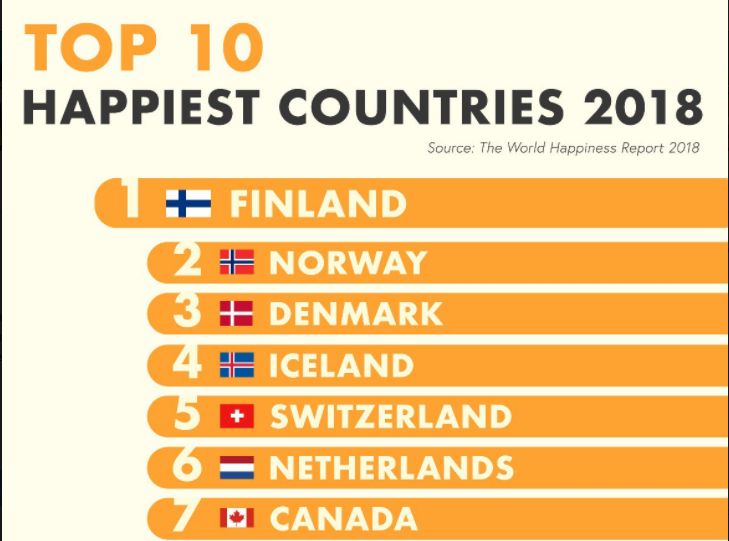Socialism: in America, it’s kind of like Voldemort. A bad thing that we don’t talk about; a word that shall not be named. But why? Socialism doesn’t really deserve its bad rap here – most of the negative connotations come from a fundamental misunderstanding of what socialism actually is. And social democracy – employed by those Nordic countries always topping happiness lists – is something that we could greatly benefit from.
The definition of socialism is:
“a political and economic theory of social organization which advocates that the means of production, distribution, and exchange should be owned or regulated by the community as a whole.”
And the idea behind using it is to give everybody an equal chance – so that every member of society can work hard and build the life that they want to without being limited by poor life circumstances.
In capitalism, you get what you work for and nothing comes for free – right? Kind of. Yes, the idea is to work hard, build something (a career, a business, a lifestyle), and reap the benefits. But something does come for free: your starting point in life – and it’s total luck of the draw. Somebody who is born into a well-off family and given food to eat, a place to sleep, and a good education is not starting from the same place as somebody born into a poor family, where food is scarce and accommodations are cold and crowded. The well-off person is getting a great springboard from which to start their life for free – and the poor person, for the same price of $0, is not.
Therefore, somebody dealt a better hand in life has a better chance of succeeding. They have support, money, education, time, etc. Success in a capitalist society doesn’t come entirely from hard work – it also comes from

To level the playing field a little, we could start to use some socialist principles. What if all families had a place to live and food to eat, and everybody had access to good education? To use my example above, there wouldn’t be as big of a difference in potential for a good life between the well-off person and the poor person. It would give people a more equal starting point from which to work hard and succeed. What’s inherently wrong with that?
The next logical thought is funding: who will pay for this? Yes, the money has to come from somewhere – usually, higher taxes. But higher taxes on the rich results in a better economy for everybody (not just those receiving help). Putting more money into the hands of the lower and middle class – the ones sure to spend it on goods and services – has always been good for business. Giving people healthcare and free education, as well as the obvious huge benefits, will give them more money to spend – helping the economy.
At the moment, our tax system is filled with loopholes to allow big companies and people with plenty of money to avoid paying tax. Wealthy people pay less in taxes on their investment income than working people do on their wages. A person that gets up early every day to go to work and do a real job that benefits society pays a higher tax rate on that income than those who may not do a thing all day but sit back and wait for their next dividend to arrive. The money necessary to effect real change and help everyday working Americans is there. We just need to prioritize our people having the necessities in life over those who are well off having higher tax bills (which will, in actuality, benefit everybody in the long run anyway).
That’s the basics of it – and the benefits have been proven. As I alluded to earlier, the Nordics constantly top happiness lists – beating us and the rest of the world. Time and time again, they say they are happier paying higher taxes. It’s not some sort of personal sacrifice – it’s for the greater good of everybody. They have free healthcare and education, so they and their children have a great chance of a happy and healthy life. Everybody gets a place to live, even when out of work or sick, and poverty doesn’t really exist. And that makes these people happy.
Everybody knows the US healthcare system is broken. Above and beyond that, preventative healthcare is cost effective. It’s cheaper to provide everybody with healthcare so that big, costly health problems can be avoided. Currently, people wait to visit the doctor until something becomes a problem because it’s expensive. In the meantime, that problem gets bigger and more expensive – and the government (i.e. we, through taxes) pay for some of that giant bill. It makes sense to make those bills smaller, right? And preventing negative health outcomes also makes people’s lives better – being sick isn’t fun for anybody. Less illness and less money spent sounds like a great idea to me.
So those are some of the things that socialism is – let’s talk about what it isn’t. It’s not communism or total government control. (*Actually, communism is technically a form of socialism – but what we’re really talking about, incorporating socialist theories and ideas into our democracy, would make us a social democracy.) I’m not saying let’s be like Russia and let the government decide everything for us and control us. America is the land of the free, and I’d like to keep it that way – actually, I’d like to make it better by incorporating the best of both worlds.
In fact, America already employs some socialism. Police officers, school, public parks, fire departments, social security (obviously), and… the military. All of these things are paid for with our taxes, which are collected and distributed by the government – and all of these things are pretty important. A country without police or military? I don’t think anybody would like that. Just like the happy Nordic countries, Americans are generally happy to pay higher taxes to sustain the police and the military. Again, it’s not some sort of personal sacrifice – it’s for the greater good of everybody. See where I’m going with this?
Now we need to apply the same logic to healthcare for a start, and improve our social security system to give every American a fighting chance. Nobody in this prosperous country should be sick or hungry. It’s that simple. Are you with me?
